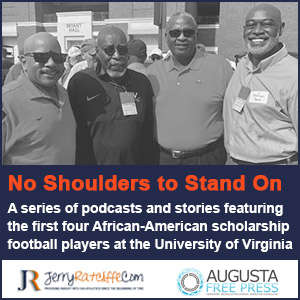Poor foul shooting, questionable coaching decisions end Virginia’s ACC Tournament hopes
By Jerry Ratcliffe
WASHINGTON, D.C. — There were 5.3 seconds burning brightly on the Capital One Arena scoreboard late Friday night in Virginia’s ACC Tournament semifinal battle with unlikely opponent North Carolina State.
At that point, ESPN’s “win-probability meter” had third-seeded UVA’s chances of locking up a spot in Saturday’s title game against top-seeded North Carolina at 98.7 percent. The Cavaliers led the Wolfpack 58-55 and had their most accurate free-throw shooter, Isaac McKneely (87 percent), going to the line for a one-and-one opportunity.
He missed.
NC State guard Michael O’Connell found the ball in his hands and launched a wild 3-pointer that banked off the glass, rolled slightly on the rim and went in, a buzzer-beating shot that sent the game into overtime.
From there, 10th-seeded NC State, playing its fourth game in four nights, showed no signs of fatigue as it owned the extra period, outscoring Virginia 15-7 and leaving the Cavaliers’ postseason in doubt with a 23-10 record.
While UVA had flirted with disaster with faulty free-throw shooting all season long, it had discovered ways to survive close games (the Cavaliers were 8-0 in contests decided by five points or less heading into the weekend).
Wahoo fans have known for quite some time that the poor foul shooting (Virginia ranks No. 344 out of 351 Division-I teams in free-throw percentage at 63.9) would eventually bite this squad.
Tony Bennett’s team was a putrid 1 for 5 at the free-throw line in crunch time, the final 70 seconds of regulation. Just one made free throw and the Cavaliers were in tonight’s championship.
UVA finished 6 of 11 at the foul line, one night after Bennett joked, “We’re saving ‘em for when we need ‘em,” after a similar shoddy performance (8 of 18) against Boston College in the quarterfinals.
“We’re not trying to miss them,” Bennett said after losing to State. “It’s not like we don’t work at them. You step to the line and that’s what it is.”
Even with McKneely’s crucial free-throw miss, pundits questioned Bennett’s late-game strategy that allowed NC State a last-second pardon.
The Wolfpack had no timeouts remaining and Virginia had three fouls to give with only five seconds to play. Why not foul O’Connell multiple times before he could get a shot off? Some of the blame for the gaffe has to lie at the feet of UVA’s coaching staff.
One former ACC coach looking on commented he would have fouled O’Connell five or six times if that’s what it took to prevent him from getting off a potential game-tying 3-pointer at the buzzer.
“Yeah, well, the three they hit, that was a tough shot that [O’Connell] hit,” Bennett said. “We couldn’t foul him in the backcourt. [State] got momentum because we missed the free throw and they were coming down, and once they got down, we did not want to foul in the act of shooting.
“We were just worried about that. We were worried about maybe if they make a free throw, and then a miss with [center D.J.] Burns and those guys rebounding the free throw.
“But we just decided let’s make them earn on that stuff. Again, we fouled a 3-point shooter before, and that hurt in a couple of those live-ball turnovers.”
True, Ryan Dunn had fouled State’s Casey Morsell behind the 3-point line with 43 seconds to go in regulation, with Morsell making all three free throws to draw the Wolfpack within three points at 58-55. Bennett’s plan was to get stops and win it at the free-throw line.
Instead, Andrew Rohde missed a wide-open 3 from the right corner with 20 seconds to play, State rebounded, called timeout and drew up a play for Morsell to shoot a potential game-tying 3, which he missed over Dunn with six seconds to go.
State fouled McKneely out of desperation and he missed, leading to the controversial decision not to foul O’Connell at the end.
Seemed the logical thing to do was to foul O’Connell before he could get a shot off and force State to throw up an even more desperate attempt.
With the game going into overtime, it seemed the prolonged ending would be in Virginia’s favor, only the No. 3-seeded Cavaliers’ second game in two days. State, on the other hand, was in its fourth game in four days, a physically demanding assignment. But it was the Wolfpack that seemed energized for a chance to survive another night.
Burns, a mountain of a man at 6-foot-9, 275 pounds (likely a bit lighter on paper than in reality), had his way with Virginia’s ‘Pack-Line’ defense in the overtime, scoring 7 of State’s 15 points, using his size to bullishly back his defender down into the lane where he is almost unstoppable and most effective.
Again, Bennett’s strategy was questioned. One of the premises of his defense is, “Don’t let a big man beat you,” which usually commands a double-team, trap the post, tying up the center and forcing him to throw the ball outside.
Bennett went against that theory and tried to play Burns mano-a-mano, which was a disaster.
Burns made the most of his 24 minutes of floor time, scoring a team-high 19 points, making 8 of 11 field-goal attempts and leading State’s domination of the paint, where the Wolfpack outscored the Cavaliers, 40-26.
In his postgame, Bennett noted, “There’s a lot of things in your mind saying could we have doubled Burns. That thought goes through your mind.”
Virginia played Jordan Minor and freshman Blake Buchanan against the physical State big man, without great success. Burns was simply too physical to handle, took advantage of his size a la former Duke big man Zion Williamson, and had some help from officials who were reluctant to call offensive fouls on the Wolfpack center.
We asked Bennett what his thinking was in rarely double-teaming Burns and making him give up the ball.
“He catches it so far off and he’s one of the best passing bigs,” Bennett said. “He catches it a lot of times at 18, 20 feet, and that’s a tough double. They sort of shredded us there.
“But we were trying to trap if he caught it in a certain spot and a couple of times we just didn’t go and then at times we said – like we had enough of a lead if he scores a tough shot we’ll give him two, and we thought we were in a good enough spot with the lead down the stretch. I think we only got one trap. A couple of times we didn’t go when we should have and a couple of times we just decided not to, and he made some tough shots. It was physical. Jordan certainly was working his tail off.”
True, but it wasn’t enough against the powerful Burns, who couldn’t be contained and made Virginia pay time after time.
“Jordan was battling his ass off,” said UVA teammate Jake Groves. “He did a good job on [Burns]. I think there were some calls — I mean, I guess a guy like that is really just a tough cover because he’s a really good passer and one-on-one he’s gonna bully a guy, and the refs obviously aren’t going to call any offensive fouls on him.”
Minor thought Burns essentially got by with assault and battery a few times in the game.
“It was hard and I knew it was going to be a challenge,” Minor said in the Virginia locker room. “I kind of wanted that challenge going into the game. I think he got away with some cheap ones and some walks. I just wanted to make it hard on him and he made some great plays, so you’ve got to give it to them.”
All things considered, Virginia should be still playing tonight, but some uncorrected, season-long ineptitude and some very questionable coaching decisions ended the tournament run prematurely.
Now, UVA’s fate lies behind closed doors in Indianapolis, where eye tests and metrics will determine if this team is good enough to go dancing. The Cavaliers could have made that decision easier.









